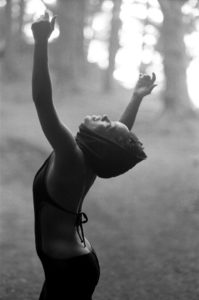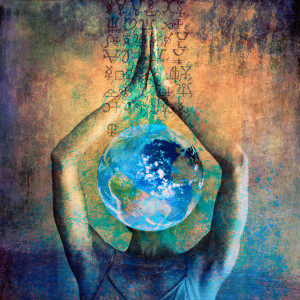“The thing you are most afraid to write. Write that.” —Nayyirah Waheed, Salt
Let me start by saying, I used to judge women who said they had postpartum depression. Maybe it was because the few stories I had heard were from famous actresses “bravely speaking out to try and remove the stigma.” Before having my own child, I would roll my eyes and assume they were selfish women who were too surprised by motherhood or maybe they just didn’t have the nurturing instinct at all.
The truth is that with any major life transition, even the ones we desperately want, there are challenges to face. While many of our cultural stories emphasize the very real joy of new motherhood, we often ignore the massive restructuring of identity that takes place as a woman leaves maidenhood behind. Many women like me become so adapted to the identity of the maiden (youthful, energetic, sweet, sexually and emotionally available) that we confuse that role with our true essence. And sometimes the only way to find our way back to ourselves is by going into the darkness.
Maureen Murdock explains in her book “The Heroine’s Journey” that “women often make their descent when a particular role, such as daughterhood, motherhood, lover, or spouse, comes to an end.” In order to leave my youth behind and become the mother I was meant to be, I had to travel like the ancient Sumerian goddess Inanna into the underworld to be stripped bare of the symbols of my old identity, die, and be reborn. In that process, I learned that life demands sacrifice but the rewards are great.
I had always wanted to be a mother. From a very young age, I carried around dolls and tended to them with utmost care. I looked after my little brother with a devotion that earned me the family nickname “little mother.” I babysat my sweet-faced cousins in my teens and generally looked forward to the day when I could dress and bathe my own little ones.
Still, I waited until my 30s to get pregnant so I had plenty of time to get my education, develop a career, travel, and invest in my personal growth. I wanted to make sure I understood how to best care for myself before I raised a child. I had a blessed life in many ways. My son’s father and I realized early in our relationship that we wanted to have kids so we could share our love. I was so excited to show my child the wonders of nature and see them discover things like their first snow.
My pregnancy was healthy and full of the joys and worries every mother encounters. I worked full-time and nested and found a wonderful birth center. When labor started, I felt prepared and supported to surrender to the mighty process that was taking place. I actually had an orgasmic birth (yes, it’s a real thing ladies!). My son came out in such glorious perfection that I was euphoric. He was my love embodied. My birth experience felt profoundly empowering and sacred. So far so good.
 What happened next was a descent. It started when I didn’t sleep or truly rest after the birth. The first night I was too excited. The second night I was too worried. I went on like that until four nights of no sleep later, I handed my baby to my mother while trying to say the words “please take him, I’m too tired,” but my mouth could only form sobs. She understood what I meant.
What happened next was a descent. It started when I didn’t sleep or truly rest after the birth. The first night I was too excited. The second night I was too worried. I went on like that until four nights of no sleep later, I handed my baby to my mother while trying to say the words “please take him, I’m too tired,” but my mouth could only form sobs. She understood what I meant.
Weeks passed and my midwives checked in on me, my husband made me smoothies and baths, my friends visited and brought food, family members came to meet the baby and cook chicken soup. I was lucky to have caring people around, but I was slipping away. It felt like I was being pulled down into an underwater realm where I could only view life behind a glass wall. In this place, my loved ones could see me and maybe even see I was drowning, but it felt like there was no way to cross the barrier into their arms.
My days felt like torment. I didn’t know how to communicate what I was feeling. I didn’t know how to ask for help. I could only mouth the words “I’m not ok” and “I’m so tired” and count each excruciating hour I made it through. My mind searched desperately for anything to buoy itself up. I made to-do lists in my head and tried to anchor myself with things like going to the grocery store or a phone call with a friend. My journal went blank, my normal enthusiasm for life drained away. When I was strong enough to take a walk, I passed a bush full of flowers that I used to delight in and I just stared at them wondering who that cheerful person could have been. The world went black and white and foggy.
I’ve never felt more alone in my life. The only thing that helped was being around other moms. I craved their company desperately. But like many urban transplants, I had moved to the Bay Area for work and wasn’t really settled in a community. I was one of the first of my friends to have kids. My son’s grandmothers both came to help for some blessed days, but each needed to return home to their work and lives.
I dreaded the nighttime and was afraid of darkness. Every evening my mood dropped with the setting sun and I wept when anyone turned off the lights in the room I was nursing in, presumably to help the baby fall asleep. “Hello!” I thought, “I’m still here! A live human adult! Can anybody hear me?”
My cell phone became my lifeline, an artificial light source to huddle under, a fake hearth to warm myself with. I scrolled through Instagram, seeing posts from other new mothers about how overjoyed they were, how every day was like Christmas with their new babe. I beat myself up inside and felt ashamed.
My midwives didn’t notice, and my pediatrician didn’t either. I honestly didn’t know that I could be treated or helped, I just figured this was motherhood. I blamed myself for not enjoying each tiny sock and whimper. I blamed myself for not thriving while my beautiful and healthy baby boy charmed the world. When I finally sought therapy six months in, my therapist concluded I was grieving due to a number of rapid changes in my life but that it wasn’t postpartum depression.
Granted, there were other challenges going on in that first year. I was pushing myself too hard at work after returning three months after birth, I was fighting with my son’s father, we were moving our family from the Bay Area to LA, and we spent close to two months at Standing Rock. But all these factors have become so interwoven with that period that it’s hard to see what was the true cause (if such a thing exists) and what was a symptom. Suffice it to say, my life and my family’s life was unbalanced. Yet I continued to pretend to be OK. I smiled and conversed and dressed my baby and took him to the park.
I was going through the motions but my heart was below the ground. A spiritual person by nature, I felt completely cut off from the beauty and love I had known my whole life.
Now I should mention here that I was trained as an actor from a young age and had been accustomed to performing at a high level in most areas of my life, whether academically, professionally, or personally. I’m generally embarrassed about seeming weak or in need of help. Chalk it up to my stoic German heritage, my Capricorn stubbornness to succeed, or just outsized pride, I don’t like to be vulnerable to anyone but my nearest and dearest. So I can see why professionals might have missed the signs. All new mothers are exhausted and in shock about what they just went through and the fact that they’re responsible for a fragile human life. The “baby blues” are normal and it takes time to find your groove. But what I experienced felt deeper than “baby blues.” I view it now as a blend of exhaustion and hormonal and chemical imbalances paired with unmet emotional and social needs—all of which are difficult to pull apart.
The shift from maiden to mother can be challenging for anyone living in a culture that privileges youth and makes mothers and older women feel invisible. I noticed I had become invisible once I started to venture out of the house with the stroller. I was used to being a confident and attractive woman in the world and it took me a moment to get used to the glazed-over look of strangers on the street that seemed to say, “oh she’s just a mom.” Hold up, wait a minute folks, I thought, should I just hang it up, stop showering, and wear sweatpants for the rest of my life?
I fully understand why so many cultures encourage seclusion and rest for 40 days after giving birth. A woman who has just opened up at every level to pull a new human life into this realm is deeply raw, vulnerable, and sensitive during the postpartum period and she needs lots of gentle care. In a way, she’s still in a liminal state between the worlds and very connected to her infant’s needs minute by minute. More than anything, she needs mothering herself so that her own nurturing energy can flow.
In my case, I was blessed with resources and people who cared about my well-being. I had access to good medical care and lived in a country at peace with more than enough to eat. So what did I do? I beat myself up about that privilege almost every day.
How could I, who had been given so much, dare to suffer when a million other women have so much more hardship and still smoothly transition to motherhood?
My ambition and overachiever tendencies had become my worst enemies. I didn’t know how to slow down and loosen the reigns. I had been conditioned to value myself based on productivity and status in the external world, but now my accomplishments were of such a private and domestic nature, I didn’t know how to evaluate myself. All the tools I had counted on to succeed in my previous life were suddenly useless in this context. I was lost and embarrassed to be lost.
The personality I had built for 30 years was shattered. I had to rebuild from the ground up. I finally admitted defeat when my son was 9 months old. My son and I flew to Chicago for Thanksgiving and stayed, first at my mom’s house then at my aunt’s. It frightened me to see myself in their eyes. They had never seen me like this. I had never seen me like this.
I took comfort in familiar places and introduced my son to landscapes from my childhood. I took on some extra work and enrolled him in a wonderful daycare for a few days a week. I tried to remember what I used to enjoy (art, singing, long hikes, thick books, and hot cups of tea). My aunt offered me her old house to rent, a home so loved up by her family, it started to heal me the day we moved in. In rare moments of nap-time quiet, I gingerly started to make flower mandalas on my living room floor and publish snippets of writing online. I set about nesting for a second time and dreaming up a life that could work.
As I healed, bouts of unexplainable rage and grief would overcome me and I felt as if I could taste the suffering of generations of women before me. Every so often, I would leave my son with his father for an hour to walk along the shore of a nearby lake. The waters always managed to soothe me.
I’m not gonna lie, it took months to recover. If I’m honest, it took a full year after the birth to feel fully present and another year to feel like myself again, albeit an upgraded, stronger version of me. This kind of timeline is not what our culture typically accepts for transitions. We are, after all, a 24/7 digital on-all-the-time culture. Women are praised for bouncing back to work at three months postpartum or sooner (which feels barbaric to me now), and many of us try to get back our “pre-baby bod” as soon as possible. But this is not something you can bootcamp your way out of.
Motherhood is not like putting on a new dress or persona. Motherhood is the rearranging of your bones, the expansion of your core, the breaking of your heart. Along with the joy, there may be mourning. Some of us may be called to deal with childhood traumas or grieve for our mothers and grandmothers.
Unfortunately, in our society, the work of mourning is not truly valued or understood and we are often bombarded by distractions and ways to avoid feeling where we are in our hearts. Little attention is paid to the immense integration of experience that a new mother must navigate. Her task of growing a new identity and way of being in the world is precious and may take awhile.
I now believe that sometimes depression shows up as the soul’s way of working through grief and transition at its own pace. I ultimately view it as a blessing and something I am grateful for. Because what I met in that underworld reshaped me completely. I uncovered in the dark my primal will to survive, the strength beneath my weakness, the dark mother of grief who turns our tears into rain. I met a well of love that poured through me into my child with more vitality than I could fathom with my mind. I met the seeds of my new life and a gratitude for simplicity that I hadn’t known before. I learned the real joy of the sunrise and the value of a mother fully awake to the rainbow of her child’s smile. I felt a broken heart sprout shoots of life up and up back into the world of the living.
 I rose slowly and steadily. Each day I felt myself returning from the long journey away from my joy. I remember the first time I slept in my bed feeling safe and the first time I woke up without crippling anxiety. I remember the first time I gave my son a bath without weeping inside. I remember the first time I was home alone with him and felt confident about our day together. I remember the day I started drawing colorful affirmations on my kitchen chalkboard and felt excited for tomorrow. I remember the day I realized that I was going to not only make it but actually thrive.
I rose slowly and steadily. Each day I felt myself returning from the long journey away from my joy. I remember the first time I slept in my bed feeling safe and the first time I woke up without crippling anxiety. I remember the first time I gave my son a bath without weeping inside. I remember the first time I was home alone with him and felt confident about our day together. I remember the day I started drawing colorful affirmations on my kitchen chalkboard and felt excited for tomorrow. I remember the day I realized that I was going to not only make it but actually thrive.
Human beings need time and space to grieve, grow, and blossom. So maybe I wasn’t on my “A game” for one year of my life. I was learning how to do the most important job I’ll ever have plus reconfiguring my relationship with my son’s father and navigating family dynamics and choices like where to live, how much to work, and so on. I was growing what I now call my “mama backbone,” the strength of a woman who can make any place a home, whose love shows through myriad small daily tasks, a woman who trusts her intuition and knows how to voice her needs.
When the ancient Sumerian goddess Inanna returns from the underworld, “she is not all sweetness and light,” says Maureen Murdock. “She now realizes the extent to which she has sacrificed herself in pleasing others, and she is not willing to do things the old way.” I am stronger and more compassionate now. I don’t procrastinate (who has the time?) and I find myself deeply protective of children of all kinds. I don’t say yes when I mean no. I don’t work until I’m exhausted. I am more balanced than ever and I’m enjoying the small triumphs of domestic life as I build a business that nourishes me and works around the needs of my family.
And so, on the eve of my son’s second birthday, newly wed to his father and brimming with creativity and optimism for the future, I can tell you that I’ve recovered from what our culture calls postpartum depression. I like to call it an initiation into my truest self, a sacred trial that took and then gave back a world more beautiful than it was before. I didn’t do it alone, but in the end it was me who learned how to heal. It was terrifying and deeply humbling but I’m here, having emerged from the underworld to blossom into life again.
8 Postpartum Tips:
1. Don’t try to mother anyone but your children.
Everyone else is grown, so save your energy. Period.
2. Make a postpartum plan.
Most women spend their time thinking about the birth and don’t fully plan their postpartum period. Do your homework and set up a support system in advance. This article is a great place to start for learning about “the fourth trimester.” Have a friend create a meal train in which your community signs up for a specific day to drop off a meal at your door. Stock your fridge with easy and nutritious foods and lots of drinks. Make sure you have a friend or family member with a car who can run to the store, as there are likely to be last-minute needs in those first days after birth.
3. Surround yourself with community.
A baby belongs to the village and it takes a village to raise one, for real. Join a mom’s circle, meetup, or playgroup before you give birth so you can build connections. If you live near family members, discuss how they can best be involved in your child’s life. Connect with other parents in your neighborhood. Make sure you have a trusted person (who’s not your romantic partner) to confide in after birth.
4. Know the signs of PPD.
There’s a misconception that you only have PPD if you have serious thoughts about harming yourself or your child or feel that you’re not bonding properly. But there are many other symptoms and ways that women experience PPD. Here’s a useful postpartum depression quiz to help you understand your symptoms.
5. Remember it’s not a competition.
I’ve concluded that type-A personalities and high achievers may be at risk for PPD because the ways in which they’ve measured success in the past are counter to the rest and slow pace needed in the postpartum period. They also may be too embarrassed to admit any trouble for fear of looking like a failure.
6. Ditch the Instagram comparisons.
We all know that our social media lives aren’t telling the whole story. So don’t assume anything about what others are going through based on those adorable photos. Here’s a great example: This photo was taken of me during one of my lowest points with PPD. Yeah, I know, crazy right? Invest your time in real heart-to-heart conversations, ideally with experienced moms.
7. Create a routine.
A regular routine is challenging with a new baby, but try to automate anything you can. Get diapers and food delivered to your door, put bills on autopay. When the baby is older, establish routines that the family can enjoy like Saturday morning library visits or walks each afternoon. Make a simple family meal plan and stick to it weekly to eliminate unnecessary choices. Trust me, the family meal plan is a life-saver.
8. Know it’s only temporary.
I never used to believe people who said, “enjoy this time with your baby, they grow so fast!” It felt like my little guy would be tiny forever. But it’s true, he changes every day and I miss holding my infant now. So soak it all in and remember that if you find a particular phase challenging, it will shift before you know it.
Photos (from top to bottom) by Alba Soler via Flickr (cc), Christopher Campbell via Unsplash, and Mickael Gresset via Unsplash





